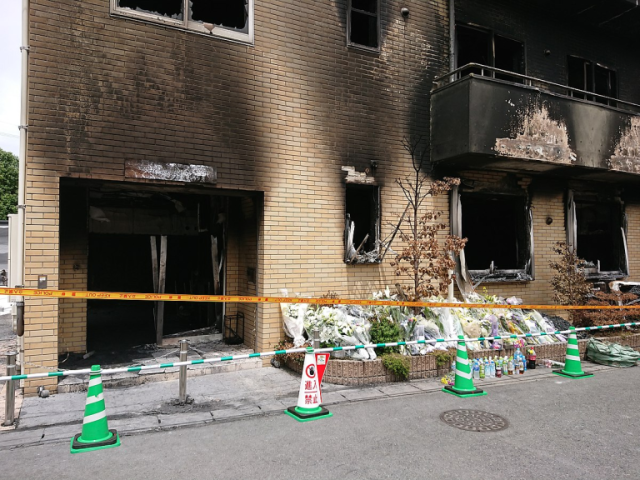
Gasoline-accelerated mass homicide has policy makers reevaluating current safety regulations.
It’s been a week since the horrific arson attack on Kyoto Animation’s Fushimi Ward anime studio. 76 workers were in the studio when the fire started, and 34 of them were killed, with burning confirmed by investigators as the cause of death for 26 victims. With such a staggering death ratio, some have speculated that the studio must have had an illegally unsafe design, but the building was in compliance with all fire codes.
Such codes are designed to prevent/minimize damage from fires that start accidentally in the course of ordinary workplace operations. The Kyoto Animation fire, though, was an attack on a magnitude far beyond that which private companies are legally required to prepare for, and is closer to the sort of security issue that government facilities, large-scale public event venues, or other high-probability terrorism targets are concerned with.
Prior to the attack, 41-year-old Shinji Aoba, who was taken into custody at the scene of the fire while shouting “They stole my novel, so I set the fire,” went to an ordinary gas station to fill two 20-liter (5.3-gallon) canisters which he’d brought with him, telling an attendant he needed the gas to power an electricity generator. He then used a hand cart to transport the fuel to Kyoto Animation’s Fushimi studio, where he ignited the gasoline inside the building’s first floor, causing an explosion. Aoba is also said to have sprayed the fuel directly on victims.
Following the arson attack, the city of Kyoto is requesting cooperation for stricter protocols in gasoline sales. Currently, gas stations are under no legal obligation to confirm the identity of customers buying gas to fill portable containers, nor to confirm their intended purpose. On July 25, though, the Kyoto municipal government sent a written request to gas station operators and trade organizations operating within the city asking them to do so. Compliance would, at least initially, be on a voluntary basis, as no such legislation is yet to be enacted.
While confirmation of identity would ostensibly mean checking the buyer’s name against a driver’s license or some other form of official ID, it’s less clear how Kyoto wants gasoline vendors to confirm the purpose of the purchase. In Japanese, the word kakunin/確認 technically refers to checking validity, but its ordinary parlance is also used in the less iron-clad sense of “check with the person.” As such, it’s not sure whether or not Aoba’s casual explanation that he needed the gasoline to power a generator would qualify as the sort of “confirmation” the Kyoto government is requesting.
Another potential flaw in the proposed system is that while confirmation of the buyer’s identity would act as a deterrent for would-be arsonists who’re hoping to get away with their crime, it would be of minimal effectiveness in stopping those who aren’t concerned about escaping prosecution, or even continuing to live themselves, after setting their intended fire. It seems the Kyoto government itself is aware that its initial proposal isn’t foolproof, and legislators are also in consultation with fire and police officials, in preparation of an expected request to change fire safety laws on the national level.
Sources: NHK News Web via Hachima Kiko. Tele Asa News via Jin
Top image: Wikipedia/L26
● Want to hear about SoraNews24’s latest articles as soon as they’re published? Follow us on Facebook and Twitter.

 Kyoto Animation arson attack leads Japanese government to develop stricter gas sale regulations
Kyoto Animation arson attack leads Japanese government to develop stricter gas sale regulations Mental illness issues could make death penalty impossible for Kyoto Animation arsonist
Mental illness issues could make death penalty impossible for Kyoto Animation arsonist Kyoto Animation arsonist begins physical therapy, regains ability to speak
Kyoto Animation arsonist begins physical therapy, regains ability to speak “Oh, is that so?” says Kyoto Animation arsonist when told how many people he killed
“Oh, is that so?” says Kyoto Animation arsonist when told how many people he killed Appeal filed to block death sentence for Kyoto Animation arsonist
Appeal filed to block death sentence for Kyoto Animation arsonist Hello, cosmetics! Clinique teams up with Hello Kitty this summer for first-time collaboration
Hello, cosmetics! Clinique teams up with Hello Kitty this summer for first-time collaboration Demon Slayer: Kimetsu no Yaiba gets new roller coaster attractions and food at Universal Studios Japan
Demon Slayer: Kimetsu no Yaiba gets new roller coaster attractions and food at Universal Studios Japan How to order snacks on a Shinkansen bullet train in Japan
How to order snacks on a Shinkansen bullet train in Japan High-fashion Totoro cuddle purse is like an elegant stroll in the forest【Photos】
High-fashion Totoro cuddle purse is like an elegant stroll in the forest【Photos】 Japan’s new difficult-to-drink-from beer glass protects your liver, but it’s a brutal experience
Japan’s new difficult-to-drink-from beer glass protects your liver, but it’s a brutal experience Kyoto Tower mascot termination reveals dark side behind cute Japanese characters
Kyoto Tower mascot termination reveals dark side behind cute Japanese characters Edible 10-yen coins become a hot new trend in Tokyo【Taste test】
Edible 10-yen coins become a hot new trend in Tokyo【Taste test】 Tsukiji Fish Market Vendor Releases Tuna For Home Assembly
Tsukiji Fish Market Vendor Releases Tuna For Home Assembly A visit to the best UFO catcher arcade in the universe!
A visit to the best UFO catcher arcade in the universe! New samurai glasses are Japan’s latest weird must-have souvenir
New samurai glasses are Japan’s latest weird must-have souvenir Nintendo history you can feel – Super NES, N64, and GameCube controllers become capsule toys
Nintendo history you can feel – Super NES, N64, and GameCube controllers become capsule toys “The most Delicious Cup Noodle in history” – Japan’s French Cup Noodle wins our heart【Taste test】
“The most Delicious Cup Noodle in history” – Japan’s French Cup Noodle wins our heart【Taste test】 Starbucks releases a cute Frappuccino and Unicorn Cake…but not in Japan
Starbucks releases a cute Frappuccino and Unicorn Cake…but not in Japan McDonald’s Japan’s Soft Twist Tower: A phantom ice cream only sold at select branches
McDonald’s Japan’s Soft Twist Tower: A phantom ice cream only sold at select branches Yabai Ramen: What makes this Japanese ramen so dangerous?
Yabai Ramen: What makes this Japanese ramen so dangerous? Finally! Nintendo Japan expands Switch 8-bit controller sales to everybody, Online member or not
Finally! Nintendo Japan expands Switch 8-bit controller sales to everybody, Online member or not Japanese government wants to build luxury resorts in all national parks for foreign tourists
Japanese government wants to build luxury resorts in all national parks for foreign tourists To combat declining birth rate, Japan to begin offering “Breeding Visas” to foreigners
To combat declining birth rate, Japan to begin offering “Breeding Visas” to foreigners 10 things you should buy at 7-Eleven in Japan
10 things you should buy at 7-Eleven in Japan Studio Ghibli releases anime heroine cosplay dresses that are super comfy to wear
Studio Ghibli releases anime heroine cosplay dresses that are super comfy to wear Woman charged for driving suitcase without a license in Osaka
Woman charged for driving suitcase without a license in Osaka Studio Ghibli unveils My Neighbour Totoro miniature house model
Studio Ghibli unveils My Neighbour Totoro miniature house model Kyoto experiencing problems with foreign tourists not paying for bus fares, but not on purpose
Kyoto experiencing problems with foreign tourists not paying for bus fares, but not on purpose Fighting mild hunger with a Japanese soda that turns into jelly in the stomach【Taste test】
Fighting mild hunger with a Japanese soda that turns into jelly in the stomach【Taste test】 Studio Ghibli’s Howl’s Moving Castle tapestry unveiled in Japan for first time
Studio Ghibli’s Howl’s Moving Castle tapestry unveiled in Japan for first time McDonald’s new Happy Meals offer up cute and practical Sanrio lifestyle goods
McDonald’s new Happy Meals offer up cute and practical Sanrio lifestyle goods Sales of Japan’s most convenient train ticket/shopping payment cards suspended indefinitely
Sales of Japan’s most convenient train ticket/shopping payment cards suspended indefinitely Sold-out Studio Ghibli desktop humidifiers are back so Totoro can help you through the dry season
Sold-out Studio Ghibli desktop humidifiers are back so Totoro can help you through the dry season Japanese government to make first change to romanization spelling rules since the 1950s
Japanese government to make first change to romanization spelling rules since the 1950s Foreigner’s request for help in Tokyo makes us sad for the state of society
Foreigner’s request for help in Tokyo makes us sad for the state of society Ghibli founders Toshio Suzuki and Hayao Miyazaki contribute to Japanese whisky Totoro label design
Ghibli founders Toshio Suzuki and Hayao Miyazaki contribute to Japanese whisky Totoro label design Doraemon found buried at sea as scene from 1993 anime becomes real life【Photos】
Doraemon found buried at sea as scene from 1993 anime becomes real life【Photos】 Tokyo’s most famous Starbucks is closed
Tokyo’s most famous Starbucks is closed Princesses, fruits, and blacksmiths: Study reveals the 30 most unusual family names in Japan
Princesses, fruits, and blacksmiths: Study reveals the 30 most unusual family names in Japan Kyoto Animation arsonist to be finally placed under arrest for July attack that killed 36
Kyoto Animation arsonist to be finally placed under arrest for July attack that killed 36 Kyoto Animation arsonist sent more than one novel to company as part of annual writing contest
Kyoto Animation arsonist sent more than one novel to company as part of annual writing contest Kyoto Animation arsonist’s psychological evaluation ends, open door to prosecution
Kyoto Animation arsonist’s psychological evaluation ends, open door to prosecution Death penalty formally requested for Kyoto Animation arsonist by prosecutors as trial closes
Death penalty formally requested for Kyoto Animation arsonist by prosecutors as trial closes Kyoto Animation comments on arsonist arrest: “Our friends whose lives were taken won’t come back”
Kyoto Animation comments on arsonist arrest: “Our friends whose lives were taken won’t come back” Kyoto Animation accepting direct, individual donations for arson victims via special bank account
Kyoto Animation accepting direct, individual donations for arson victims via special bank account Kyoto Animation studio in arson attack found to have been in compliance with all fire codes
Kyoto Animation studio in arson attack found to have been in compliance with all fire codes “We will not go quietly into the night. We will not vanish without a fight,” vows Kyoto Animation
“We will not go quietly into the night. We will not vanish without a fight,” vows Kyoto Animation Another Kyoto Animation employee passes away, brings arson death toll to 36
Another Kyoto Animation employee passes away, brings arson death toll to 36 Kyoto Animation president wants to turn site of arson attack into memorial park for victims
Kyoto Animation president wants to turn site of arson attack into memorial park for victims Kyoto Animation victims’ names may be disclosed without families’ agreement, investigator says
Kyoto Animation victims’ names may be disclosed without families’ agreement, investigator says Kyoto Animation arsonist develops a soft spot for nurse treating him at hospital
Kyoto Animation arsonist develops a soft spot for nurse treating him at hospital New arrest warrant issued for Kyoto Animation arson suspect
New arrest warrant issued for Kyoto Animation arson suspect
Leave a Reply